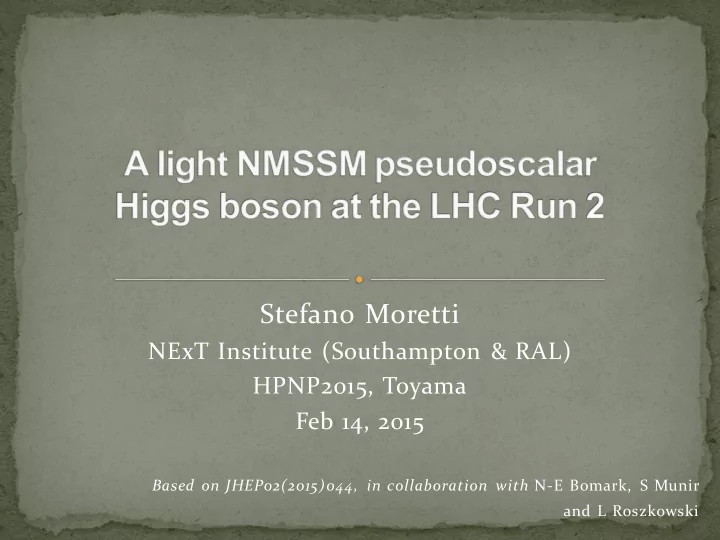

Stefano Moretti NExT Institute (Southampton & RAL) HPNP2015, Toyama Feb 14, 2015 Based on JHEP02(2015)044, in collaboration with N-E Bomark, S Munir and L Roszkowski
The NMSSM The singlet-like pseudoscalar NMSSM parameter scans Signal-to-background analysis Expected sensitivities at the 14 TeV LHC Summary
Additional Higgs singlet superfield Ŝ EWSB -> µ eff = λ v S 5 new parameters (beside 120+ of MSSM): λ , κ , A λ , A κ , v S Predicts 5 neutral Higgs boson states, scalars H 1,2,3 and pseudoscalars A 1,2 , and a charged pair H ± NUHM-C NMSSM: Imposing GUT-scale universality reduces the total No. of free parameters to 9
• h to aa via 4μ, 2μ2τ and 4 τ: - LEP2 [ALEPH, OPAL]: h-> aa, m(h)<108 GeV - Tevatron [D0]: 3.6 GeV < ma < 19 GeV with 86 GeV < m(h) < 200 GeV - CMS-PAS-HIG-13-010 covered 0.25 GeV < m(a) < 3.55 GeV (4μ), no limits for m(a)> 2m(τ) - CMS-PAS-HIG-14-019 covers 2m( τ )<m(a)<2m(b) via 4 τ h to aa via 4b: - ATLAS-CONF-2014-005, CMS-PAS-HIG-14-013 a to di-photons: - ATLAS arXiv:1407.6583 (65 GeV onwards) - CMS-PAG-HIG-14-006 (150 GeV onwards)
Mass of the singlet-like pseudoscalar Mass of the SM-like Higgs state H SM can be either H 1 or H 2 in the NMSSM Important production channels of A 1 (< 150 GeV mass): gg bbA 1 (associated production with b quarks) H’’ A 1 A 1 /Z; ( H’’ produced via gf ) H’’ = H SM or H’ A 1 further decays into bb or τ + τ - , Z to l + l -
Longer cascade (less ET(miss))->reduced impact wrt MSSM & also less crucial (no need of stops)
Tools Sushi v1.1.1 for gf and bbh signal cross sections MadGraph 5 for the BGs Pythia 8.18 interfaced with FastJet 3.0.6 for jet reco Mass spectra and BRs calculated using NMSSMTools 4.2.1 Acceptances
Jet substructure method ( Butterworth et al., 0802.4270) used A 1 bb : one fat jet or two single b -jets A 1 τ + τ - : two τ - jets (Conservative) 50% b , τ -tagging efficiency assumed 6 possible final state combinations for H ’’ A 1 A 1 3 possible final state combinations for H ’’ A 1 Z For H’’=H SM a candidate signal should have invariant mass 125±20 GeV in case of A 1 A 1 & 125±10 in case of A 1 Z
Cluster all final state visible particles using Cambridge- Aachen algorithm with R = 1.2 For jets with p T > 30 GeV and invariant mass > 12 GeV, go back in the clustering sequence until a relatively symmetric mass drop is achieved: m j1 ,m j2 / m j < 0.67 and These two jets clustered using CA with Fat jet: If two hardest jets are b-tagged and the three hardest jets together have an invariant mass > 12 GeV, they are coming from an A 1 Remaining particles reclustered using anti-kT algorithm with R = 0.4, in order to find single b -jets
Discovery reach: S/√B > 5 at 30/fb, 300/fb and 3000/fb for LHC run-II with √s = 14 TeV Multiplied by 0.9 for A 1 bb and by 0.1 for A 1 τ + τ -
CMS: [CMS-PAS-HIG-14-009] ATLAS: [ATLAS-CONF-2014-009] Green: b -physics, relic density and HiggsBounds only Not accessible for any final state combination
Should be accessible at as low as 30/fb for H SM and H 1 decays in the bb τ + τ final state But only if m A1 < 62 GeV
Not accessible even at 3000/fb for H SM decay H 3 decay carries promise! Supplements the H SM A 1 A 1 channel well for m A1 > 62 GeV
The NMSSM parameter space where a < 150 GeV pseudoscalar can be obtained is tightly constrained by the Higgs boson data from the LHC Studied scope of A 1 2b & 2 τ in 4 τ, 2b2τ, 4b, 2b2l & 2τ2l The discovery prospects for an A 1 produced in association with b -pair are extremely poor However, A 1 produced via decays of the heavier CP-even Higgs bosons could be detectable even at 30/fb When H SM A 1 A 1 is kinematically forbidden, the A 1 Z production channel, which has hitherto not been explored experimentally, carries promise Currently testing within CMS, 2b -tags in fat jet crucial
Recommend
More recommend